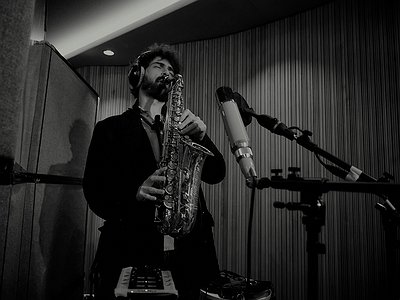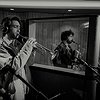Part 1
Name: Benjamin Samuels
Nationality: Australian
Occupation: Saxophonist, composer, improviser
Current event: Benjamin Samuels's debut album Dissensation is out now via Bridge The Gap.
Recommendations: The Creative Act, Rick Rubin. If you haven't read it, it is an absolute must. I have always liked Rick Rubin. This book is absolutely brilliant much closer to a creative bible than a book (something to take with you everywhere).
Shabaka: Percieve its Beauty Acknowledge its Grace. I can’t stop listening to this record an incredible musical works. His opening track “End of Innoncence” is super beautiful.
If you enjoyed this Benjamin Samuels interview and would like to know more about and stay up to date with his music, visit him on Instagram, and Facebook.
Do you think that some of your earliest musical experiences planted a seed for your interest in improvisation?
For me I believe some of my early experiences did plant a seed for me to later explore improvisation.
I learned piano from when I was young and learned clarinet from around 10. I was always interested in the idea of Jazz and Improv. I remember listening to a Benny Goodman track "Bumble Bee Stomp" in a music class at school, and that track really changed my perception and made me want to pursue Improv, Jazz and ultimately be a fulltime musician.
When did you first consciously start getting interested in musical improvisation? Which artists, teachers, albums or performances involving prominent use of improvisation captured your imagination in the beginning?
After "Bumble Bee Stomp" I changed my clarinet teacher and to a Sydney-based Jazz teacher Bruce Allan.
He started taking me through scales for improvising, introduced me to the Real book and the Charlie Parker Omni Book around that period. I then starting listening a lot to Eddie Daniels, Charlie Parker, Benny Goodman, Artie Shaw and some early John Coltrane.
After this, around 16, I was really getting into the Blue-note catalogue and Miles Davis followed by a serious addiction to John Coltrane. Following this I started experimenting a lot with various harmonic concepts inspired by these listening sessions. The first track on the album (“Dissensation Part 1”) is strongly influenced by this period and written when I was around 16.
After this period I studied at the Conservatorium Classical Music and then changed my teachers to Australian Jazz and World Music master Sandy Evans. Under her tutelage I started to explore some Ethnomusical influences. Specifically I started exploring Indian music, Klezmer and Romanian Music and how these styles can intersect with Jazz and improvisation.
In terms of this album I really feel this influence on the track “Ambitious Antithesis” which was an attempt to explore that melting-pot of influences.
Tell me about your instrument and/or tools, please. What made you seek it out, what makes it “your” instrument, and what are some of the most important aspects of playing it?
For me, I love saxophone, but it came later. Clarinet came first.
Since about 7 or 8 years old I was very interested in the Clarinet and wanted to play. I saw it in a public performance with the Symphony at the Sydney Opera House around that time and I was motivated to play. My parents instead recommended I try recorder until my hands were a bit bigger. I played recorder for a while and after this I changed to Clarinet when I was about 10 or 11.
I have always also enjoyed the fact the Clarinet in improvised music and Jazz is fairly underrepresented (at least compared to Saxophone).
As time has gone on I really enjoy rocking up to a Jam session or something with Clarinet, sometimes it still causes confusion whether it’s a classical or Jazz instrument (Shabaka and a number of others are helping make the “clarinet cool again”).
In terms of Sax that came later for me around 17. I “inherited” my brother’s Alto Sax as he stopped playing (I still play on that Sax!). This was a very interesting moment for me as I connected with the instrument a lot. I just didn't feel that comfortable on the instrument for a while. I have played quite a lot of Sax to get to this point. Finally now I feel comfortable on both instruments.
It was never quite a technical thing though, it took me a long time to feel “I could say” what I wanted to on Saxophone vs the Clarinet.
How would you describe your own relationship with your instrument – is it an extension of your self/body, a partner and companion, a creative catalyst, a challenge to be overcome, something else entirely?
For me the Clarinet and Sax are definite creative catalysts. I feel inspired to write and improvise and discover when I’m holding those instruments. It is in these moments by myself where I probably write the most music and discover a lot musically.
My favourite way to write is between Clarinet, Sax and Keyboard and to be in a comfortable space to explore with these instruments. I then like to translate this to a band through a hand-written chart or voice-memo or talking or whatever, I’m a bit old-school!
I find that when I’m playing Klezmer music that the Doinas, the solo opening sections to a traditional song, can be very powerful, emotional and at those points the instrument really becomes an extension of the body and the soul.
Derek Bailey defined improvising as the search for material which is endlessly transformable. What kind of materials have turned to be particularly transformable and stimulating for you?
Some materials that have been particularly transformable for myself have been some of my own travel, performing and touring experiences with much of the Album’s base materials created from a number of voice memos recorded around the world in Melbourne, Sydney, Europe and America.
Additionally I have been inspired by harmonic content of John Coltrane, the style and approach of Miles Davis to composing and improvising, particularly in the Bitches Brew Period and I have always been interested in the way that Jazz has intersected with Hip-Hop, Spiritual Music, Klezmer Music, Romanian Music etc. These concepts have been things I have been inspired by ever since I was writing this Album.
For me multiple tracks off the Album are playing with the concepts and styles for example “GB’s Groove” were very inspired by much of the UK Jazz I was watching at the different festivals I was touring with Grouch in Dub in the UK.
In Dissensation, the opening is an old composition that I re-composed in a more Spiritual Jazz style (particularly inspired by Alice Coltrane and Pharaoh Sanders). Other tracks from the album, including "Ambitious Antithesis," are inspired by my travels and time spent around European Folk music and Latin Music.
Do you feel as though there are at least elements of composition and improvisation which are entirely unique to each? Based on your own work or maybe performances or recordings by other artists, do you feel that there are results which could only have happened through one of them?
I believe that the line between composition and improvisation is quite fluid. I often view the composition as a vehicle for the improvisation and sometimes vice-versa. Obviously, something can be more arranged and through-composed and I think this has its place but I believe the ethos behind the composition is important. “Is the composition just a random collection of notes scrawled on a page in an apparent order”, or is the composer trying to say something unique and this is their best “voice” to do it?
I think at its core, music is organic. And something as simple as a “noise” or “tone” can be transformed, morphed and twisted into music. If you take, let's say, 4 notes from the noise you hear outside as your ‘inspiration or base material’ then I think the primary difference at that point is the direction you choose to go.
If you choose to improvise, you journey into more shaky and unknown lands, improvising with this cell or collection of notes giving yourself options of changing rhythms, timbres and structures creating something beautiful or perhaps just creating chaos that resembles the original noise again. If however, you choose to “compose” with this little collection of notes the result may musically be the same but the simple fact that it is written down and captured on the page, has already solidified its existence for better or worse.
I think it is important to note that if certain textures, notes, styles and timbres are desired by the composer to be represented because they hold a certain and specific value to them and their audience then perhaps this is more suitable to composition?
When you're improvising, does it actually feel like you're inventing something on the spot – or are you inventively re-arranging patterns from preparations, practise or previous performances? What balance is there between forgetting and remembering in your work?
I am always “forgetting” my own work. I have an idea of where it’s going, how the tunes go etc. “But don´t ask me to play the album note for note” … I am always trying, in the sections I have written for improvising, to be inventing something fresh and feeding off the audience and band as much as possible, trying to drive new and spontaneous composition through these sections.
Obviously sometimes you go back to some familiarity - maybe when you’re stuck in a section, or it might make sense to bring it back to something you have played before/on the record. I think there does need to be some balance between the two and I don't believe there is too much wrong with relying on what you know (sometimes).
I personally really enjoy playing with musicians who can really re-interpret my compositions as opposed to just play the chart. Personally, I love to play with a band that is flexible enough to warp my compositions, repeat sections, bring the composition back, extend it or change it and sometimes sacrifice the chart/original composition for sake of something they believe is better in the moment.
On the record “Gb’s Groove” is a strong example of the band exploring this specific groove, harmony and melody without too many barriers or expectations. I just really let the band explore on this track and I believe the music really benefited from just letting the bad explore.






